《Losing Pravda》是Cambridge University Press出版的圖書,作者是Natalia Roudakova
基本介紹
- 中文名:Losing Pravda
- 作者:Natalia Roudakova
- 出版社:Cambridge University Press
- 出版時間:2017年7月31日
- 頁數:304 頁
- 裝幀:Hardcover
- ISBN:9781107171121
- 價格:USD 99.99
內容簡介
What happens when journalism is made superfluous? Combining ethnography, media analysis, moral and political theory this book examines the unravelling of professional journalism in Russia over the past twenty-five years, and its effects on society. It argues that, contrary to widespread assumptions, late Soviet-era journalists shared a cultural contract with their audiences, wh...(展開全部) What happens when journalism is made superfluous? Combining ethnography, media analysis, moral and political theory this book examines the unravelling of professional journalism in Russia over the past twenty-five years, and its effects on society. It argues that, contrary to widespread assumptions, late Soviet-era journalists shared a cultural contract with their audiences, which ensured that their work was guided by a truth-telling ethic. Post-communist economic and political upheaval led not so much to greater press freedom as to the de-professionalization of journalism, as journalists found themselves having to monetize their truth-seeking skills. This has culminated in a perception of journalists as political prostitutes, or members of the 'second oldest profession', as they are commonly termed in Russia. Roudakova argues that this cultural shift has fundamentally eroded the value of truth-seeking and telling in Russian society. ‘Natalia Roudakova brings deep ethnographic research, fluency in social theory, and an engaged ethical sense for the deep urgency of journalism to this thoughtful and essential book. Her account of the surprising career of Russian journalism - from its fall from grace as a moral outlet under the Soviets to its ‘prostitution' in a time of oligarchs, big money, and ‘kompromat' - offers not only a sparkling case study but a vision of the high societal stakes of journalism more generally. Losing Pravda presents us with an uncannily familiar media environment. The conditions that Roudakova analyses, such as fake news, sponsored content,

